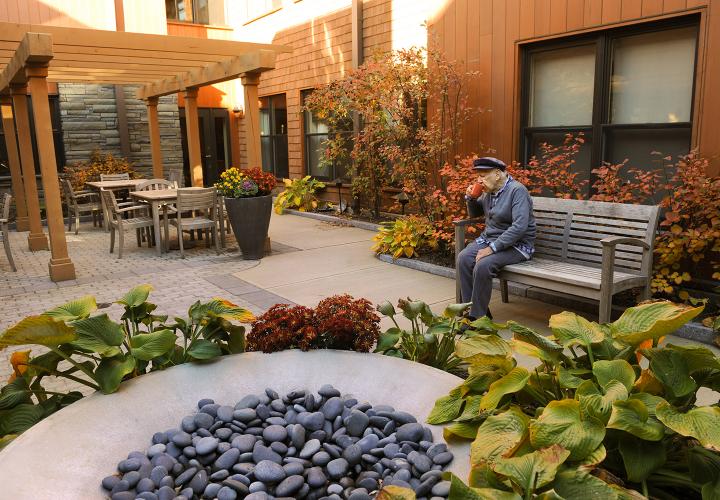Developing a Safe and Helpful Environment for Alzheimer's Care
The creation of a safe and encouraging environment for individuals with Alzheimer's is paramount in improving their top quality of life. This entails not just physical adjustments within the home, such as lessening threats and incorporating acquainted components, but additionally the execution of structured regimens and meaningful activities that provide to their cognitive demands. Moreover, understanding the psychological and mental dimensions of treatment can dramatically impact their sense of security and link. Discovering these diverse approaches can expose essential insights into reliable caregiving approaches that might transform the everyday experiences of both people and caregivers.
Comprehending Alzheimer's Needs
Frequently, individuals with Alzheimer's condition exhibit a variety of requirements that call for tailored approaches to care. As the condition advances, cognitive decrease manifests in different means, influencing memory, reasoning, and also the capability to execute daily activities. Caregivers need to acknowledge these developing demands to provide suitable support and guarantee a higher high quality of life for those influenced.
One important facet of recognizing Alzheimer's needs is recognizing the importance of regular and familiarity. Individuals frequently locate convenience in well established patterns, which can lower anxiousness and complication. Caretakers need to make every effort to produce organized everyday timetables that integrate purposeful tasks aligned with the person's interests and abilities.
Additionally, efficient interaction is critical. Individuals with Alzheimer's might have a hard time to express themselves or comprehend intricate language. Caregivers need to utilize basic, clear language, use non-verbal cues, and method active listening to foster understanding and link.
Caretakers need to urge engagement in area activities or family members celebrations, promoting a feeling of belonging and objective. Recognizing these varied demands is important for developing an encouraging care setting.
Creating a Safe Home
Creating a safe home for individuals with Alzheimer's illness is essential to promoting and decreasing threats self-reliance. Guarantee that pathways are clear and well-lit, as proper illumination reduces disorientation and enhances mobility.
Incorporating flexible features is likewise important. Mount grab bars in bathrooms and near stairs, and take into consideration utilizing non-slip mats in wet locations. In addition, utilizing contrasting colors for wall surfaces and floorings can help in identifying areas, aiding to reduce complication.
Experience is necessary for people with Alzheimer's. Customizing the setting with acquainted items and photos can strengthen a feeling of belonging and safety - Alzheimers Care Charlotte. It is likewise useful to have a designated area for daily tasks, such as analysis or crafting, which can give structure to their day
Last but not least, executing a secure outside area allows for risk-free exploration while getting in touch with nature. By thoughtfully designing the home setting, caretakers can dramatically boost the top quality of life for individuals living with Alzheimer's illness.
Enhancing Interaction Skills

Non-verbal interaction, consisting of face expressions, motions, and touch, plays a crucial role in sharing empathy and understanding. Preserving eye contact and a tranquil temperament can improve the convenience degree of the person, advertising a sense of safety.
In addition, it is essential to practice active listening. This involves being completely present, showing persistence, and allowing the individual to express themselves without interruption. Repetition might be needed; caregivers ought to be prepared to take another look at questions or topics, as individuals with Alzheimer's may have problem with memory recall.
Furthermore, utilizing visual help or signs, such as photographs or familiar things, can help with recognition and engagement. Ultimately, improving interaction skills is concerning developing trust and creating an environment where individuals feel heard, valued, and recognized, thereby enriching their top quality of life.
Motivating Social Communication
Promoting significant social interactions can substantially improve the well-being of people with Alzheimer's disease. Engaging with others not just aids battle feelings of isolation yet likewise promotes cognitive function and emotional health. Structured social activities, such as group video games, crafts and arts, or songs treatment, develop chances for locals to connect with peers and caretakers, which can lead to enhanced state of mind and reduced stress and anxiety.
Developing a welcoming setting that encourages socialization is vital. This can be accomplished by setting up common rooms that assist in interaction, such as comfortable seating areas or activity spaces. Additionally, including acquainted and culturally appropriate tasks can trigger memories and urge participation, permitting people with Alzheimer's to really feel more connected to their previous experiences.
Furthermore, caregivers should be trained to identify and promote social interaction amongst locals. Straightforward motions, such as launching conversation or assisting in little team discussions, can assist people feel valued and consisted of. Regularly scheduled gatherings ought to be constant yet adaptable, suiting differing levels of capability and interest. By prioritizing social interaction, we can significantly improve the lives of those dealing with Alzheimer's, cultivating a feeling of community and belonging.
Sustaining Caregiver Wellness

To sustain caregivers, companies should use routine training and educational resources to improve their understanding of Alzheimer's illness and caregiving strategies. Offering accessibility to reprieve care services allows caregivers to take necessary breaks, decreasing anxiety and fatigue - Alzheimers Care Charlotte. Furthermore, promoting an area through support system can assist in psychological sharing and the exchange of practical advice among caretakers, creating a network of shared assistance
Psychological health and wellness resources, such as therapy services, can also be crucial in addressing the psychological toll caregiving can Continued take. By focusing on caretaker health, we create a more lasting caregiving setting that not just benefits the caretakers themselves however also boosts the overall top quality of treatment gotten by people with Alzheimer's. Eventually, supporting caretakers is a crucial part in promoting a efficient and thoughtful care setup.
Final Thought
To conclude, the production of a safe and encouraging environment for people with Alzheimer's is crucial to improving their lifestyle. By prioritizing safety with thoughtful layout, fostering emotional health with familiar aspects, and promoting engagement with structured regimens, caretakers can considerably impact the total experience of those influenced by this problem. Furthermore, supporting caregiver health is important, as it eventually adds to a much more caring and effective treatment setting.
Repetition may be required; caregivers ought to be prepared to revisit questions or topics, as people with Alzheimer's may battle with memory recall.

Comments on “Professional and Dedicated Solutions for Alzheimers Care Charlotte Citizens”